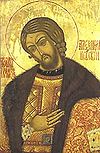- Nikolay Uspensky
-
Nikolay Uspensky 
Born May 31, 1837
Tula Province, RussiaDied November 2, 1889 (aged 52)
Moscow, RussiaNikolay Vasilyevich Uspensky (Russian: Никола́й Васи́льевич Успе́нский), born May 31, 1837 – died November 2, 1889, was a Russian writer, and a cousin of fellow writer Gleb Uspensky.
Contents
Biography
Nikolay Uspensky was born in a small village in Tula Governorate, where his father was a priest. He received his early education at the local seminary. In 1856 he enrolled in the Medical Academy at St. Petersburg University. He later transferred to the History Department of the university, but left without graduating in order to pursue a career in literature.[1]
His first two fictional sketches were published in 1857. His third sketch A Good Existence was published in the popular journal The Contemporary, and attracted the attention of many prominent liberals, including Nikolay Chernyshevsky, who appreciated the solid realism of the work, which was in marked contrast with the usual idealized portrayals of peasant life that were common at the time. In response to these sketches, Chernyshevsky wrote his essay Is This the Beginning of a Change?
For the next few years, Uspensky contributed regularly to The Contemporary. His writing, often lightly tinged with humor, described the poverty and the misery of the peasants, and the lives of Russian clergymen and raznochintsy intellectuals. By 1861, though, his popularity began to decline, he had problems with the editor of The Contemporary, Nikolay Nekrasov, and his continued efforts at writing met with less and less success.
In 1862 he took a job as a teacher at Leo Tolstoy's Yasnaya Polyana School, followed by other teaching jobs at various district schools and gymnasiums throughout the 1860s and 70s.[1][2]
In 1878 Uspensky was married, but his wife died only three years later. After this he lived a wandering, and often homeless life, drinking heavily, and occasionally publishing his writing in The Russian Gazette, and in tabloids. He also made money performing as a street musician and singer.
In 1889 he committed suicide by stabbing himself.[1][2]
Notes
English translations
- Porridge, and The Village Schoolmaster, (Stories) from The Humor of Russia, Ethel Voynich/Stepnyak, Walter Scott Publishing, 1909. from Archive.org
References
- ^ a b c Handbook of Russian Literature, Victor Terras, Yale University Press 1990.
- ^ a b The Great Soviet Encyclopedia, 3rd Edition (1970-1979). 2010, The Gale Group, Inc.
People from Russia Leaders and religious - Pre-1168
- 1168–1917
- 1922–1991
- 1991–present
- RSFSR leaders
- General secretaries
- Soviet premiers (1st deputies)
- Soviet heads of state (and their spouses)
- Prime ministers (1st deputies)
- Foreign ministers
- Prosecutors general
- Metropolitans and patriarchs
- Saints

Military and explorers - Field marshals
- Soviet marshals
- Admirals
- Aviators
- Cosmonauts
Scientists and inventors - Aerospace engineers
- Astronomers and astrophysicists
- Biologists
- Chemists
- Earth scientists
- Electrical engineers
- IT developers
- Linguists and philologists
- Mathematicians
- Naval engineers
- Physicians and psychologists
- Physicists
- Weaponry makers
Artists and writers Sportspeople - Chess players
Categories:- 1837 births
- 1889 deaths
- Russian short story writers
- Russian journalists
- Russian educators
- Saint Petersburg State University alumni
- Writers who committed suicide
- Suicides in Russia
Wikimedia Foundation. 2010.
